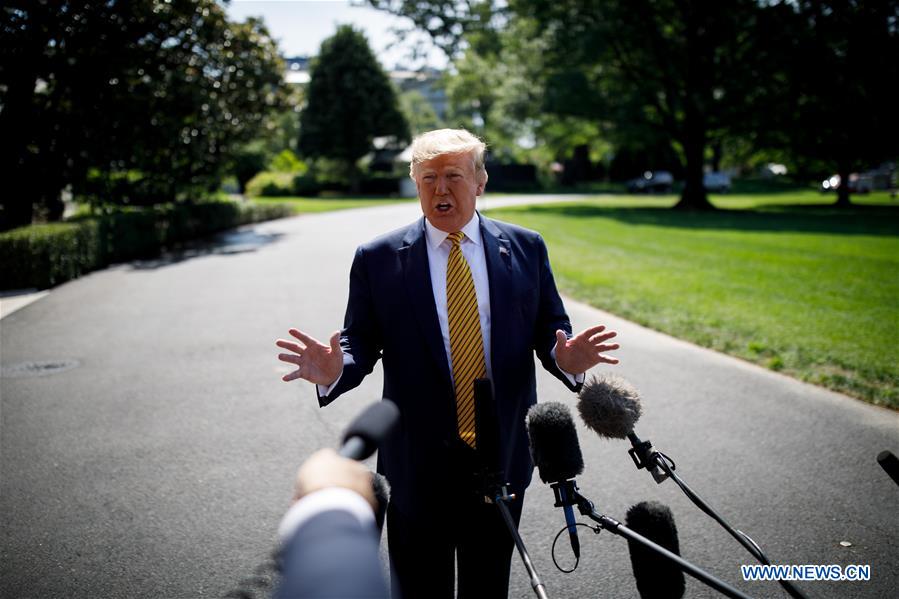Trump's actions leading to rising tensions between US and Iran
- By Mitchell Blatt
 0 Comment(s)
0 Comment(s) Print
Print E-mail China.org.cn, June 26, 2019
E-mail China.org.cn, June 26, 2019

The progressively escalating strife between the United States and Iran nearly turned deadly on Thursday, June 20, before the U.S. president canceled missile strikes that were on the brink of launch. Trump likes to take credit for his "restraint," but it is worth reviewing how we got here in the first place.
Trump's bellicose saber-rattling and lack of diplomatic efforts were precisely what brought U.S.-Iran relations to a boiling point. In this particular case, Trump made the right decision to cancel strikes. But why did he give the order to plan strikes in the first place? Why, now, while having avoided military war, is Trump increasing the magnitude of economic warfare?
Let's look back to the Obama administration to shed some light on this. In 2015, the United States, under Obama's leadership, along with China, France, Germany, Russia, the U.K., and the EU agreed to the Joint Comprehensive Plan of Action to limit Iran's nuclear development program. U.S. officials were worried that Iran might try to develop nuclear weapons. The JCPA would make it difficult for Iran to do so by reducing its stockpile of uranium and gas centrifuges and putting limits on its enrichment facilities.
Republican opponents of Obama criticized the Iran deal from the very start and said it simply wasn't tough enough. Critics said it only covered Iran's nuclear program, not its missile testing or its foreign policy activities in Syria and elsewhere. However, it's important to remember that the deal focused on nuclear enrichment – not on Syria, Hezbollah, or anything else – and putting separate issues on the table would have distracted from the most important issue.
The truth is Republicans are generally more hawkish than Democrats and less supportive of diplomacy. They would have opposed any conceivable deal, especially a deal negotiated by President Obama. In addition, many Republicans opposed anything that Obama supported. Most of those running for the Republican nomination against Trump also promised to scrap the deal if they were elected.
In reality, Trump never gave the deal a chance from the start. "You know the Iranians are going to cheat," he said in an interview with NBC during the summer of 2015. In the end, it was Trump who violated the deal early on in his second year of office, the same deal which Iran continues to uphold to this day.
It was common knowledge to foreign policy analysts that pulling out of the deal would increase tensions and raise the possibility of war. Obama himself said in a speech to Congress in 2015, "The choice we face is ultimately between diplomacy or some form of war – maybe not tomorrow, maybe not three months from now, but soon."
What a surprise then that one year after Trump rescinded America's participation in the deal, the two countries are now close to some form of war!
Trump began making threatening statements towards Iran in June 2018, directing a tweet at Iran's president that read (in all-caps), "you will suffer consequences the likes of which few throughout history have ever suffered before."
He put sanctions – essentially waging economic warfare – on Iran in November 2018, though he had waivers in place and allowed eight major countries to continue trading oil with Iran. Now Trump has rescinded the waivers. Iran's GDP fell by 3.9% in 2018 and is on track to decline by 6% in 2019, according to the IMF. Given U.S. antagonism under the Trump administration, why wouldn't Iran respond to defend its national interests?
The Iranian military shot down an unmanned U.S. drone on June 20. Iran took credit for the action. The Commander-in-chief of the Revolutionary Guard, Hossein Salami claimed the drone was flying over Iranian airspace and said, "Iran is not seeking war with any country, but we are fully prepared to defend Iran." The U.S. denied the drone was flying over Iranian airspace.
There have also been a series of international oil tankers that were bombed in the Strait of Hormuz. While Iran has denied responsibility for any of the attacks, Iran's Revolutionary Guard has been clear about its threats to close the Strait of Hormuz in the event of a war or some other high stakes crisis.
The Strait serves not only as an artery to transport Iranian oil, but also Saudi Arabian and UAE oil. Both countries are on the other side of regional disputes with Iran and continue to enjoy positive relations with the U.S. and U.S. allies. As such, any trouble in the Strait of Hormuz could raise oil prices for the whole world and cause problems for American allies.
Both the shooting down of the drone and the threats to close the Strait only came after Trump had imposed needless sanctions on Iran. Had Trump remained in compliance with the Iran deal, none of this would have happened. Trump should have shown restraint in May 2018.
Mitchell Blatt is a columnist with China.org.cn. For more information please visit:
http://www.china.org.cn/opinion/MitchellBlatt.htm
Opinion articles reflect the views of their authors, not necessarily those of China.org.cn.
If you would like to contribute, please contact us at opinion@china.org.cn.






Go to Forum >>0 Comment(s)